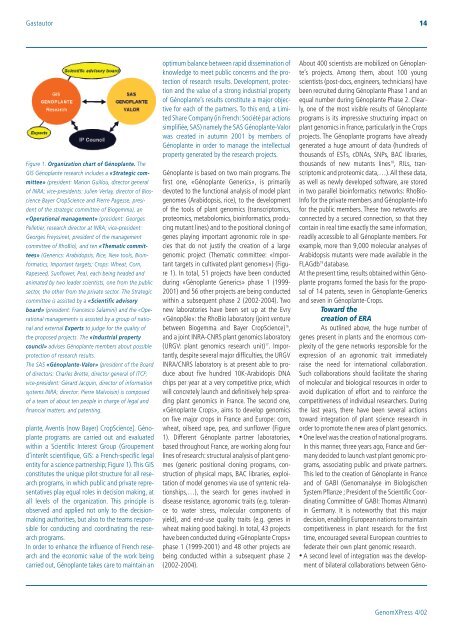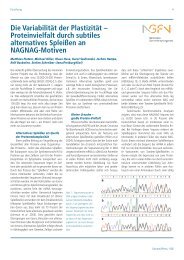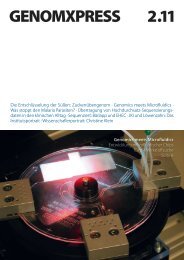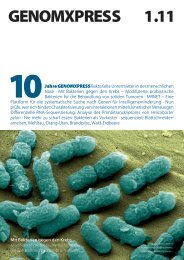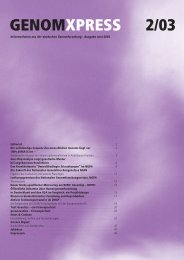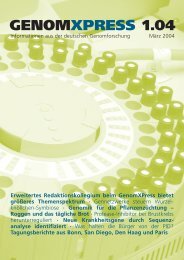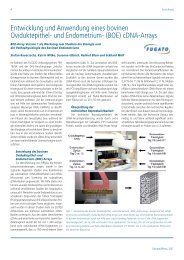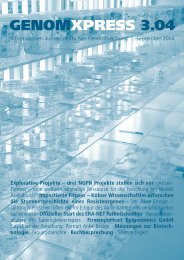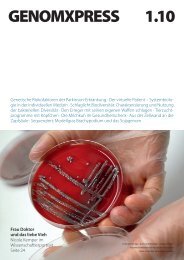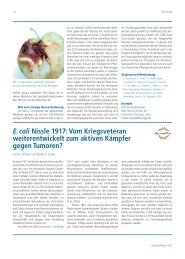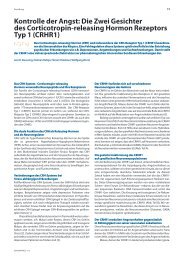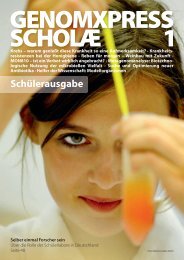Download GENOMXPRESS 4/2002
Download GENOMXPRESS 4/2002
Download GENOMXPRESS 4/2002
Sie wollen auch ein ePaper? Erhöhen Sie die Reichweite Ihrer Titel.
YUMPU macht aus Druck-PDFs automatisch weboptimierte ePaper, die Google liebt.
Gastautor 14<br />
Figure 1. Organization chart of Génoplante. The<br />
GIS Génoplante research includes a «Strategic committee»<br />
(president: Marion Guillou, director general<br />
of INRA; vice-presidents: Julien Verlay, director of Bioscience<br />
Bayer CropScience and Pierre Pagesse, president<br />
of the strategic committee of Biogemma), an<br />
«Operational management» (president: Georges<br />
Pelletier, research director at INRA; vice-president:<br />
Georges Freyssinet, president of the management<br />
committee of RhoBio), and ten «Thematic committees»<br />
(Generics: Arabidopsis, Rice, New tools, Bioinformatics,<br />
Important targets; Crops: Wheat, Corn,<br />
Rapeseed, Sunflower, Pea), each being headed and<br />
animated by two leader scientists, one from the public<br />
sector, the other from the private sector. The Strategic<br />
committee is assisted by a «Scientific advisory<br />
board» (president: Francesco Salamini) and the «Operational<br />
management» is assisted by a group of national<br />
and external Experts to judge for the quality of<br />
the proposed projects. The «Industrial property<br />
council» advises Génoplante members about possible<br />
protection of research results.<br />
The SAS «Génoplante-Valor» (president of the Board<br />
of directors: Charles Brette, director general of ITCF;<br />
vice-president: Gérard Jacquin, director of information<br />
systems INRA; director: Pierre Malvoisin) is composed<br />
of a team of about ten people in charge of legal and<br />
financial matters, and patenting.<br />
plante, Aventis (now Bayer) CropScience]. Génoplante<br />
programs are carried out and evaluated<br />
within a Scientific Interest Group (Groupement<br />
d’interêt scientifique, GIS: a French-specific legal<br />
entity for a science partnership; Figure 1).This GIS<br />
constitutes the unique pilot structure for all research<br />
programs, in which public and private representatives<br />
play equal roles in decision making, at<br />
all levels of the organization. This principle is<br />
observed and applied not only to the decisionmaking<br />
authorities, but also to the teams responsible<br />
for conducting and coordinating the research<br />
programs.<br />
In order to enhance the influence of French research<br />
and the economic value of the work being<br />
carried out, Génoplante takes care to maintain an<br />
optimum balance between rapid dissemination of<br />
knowledge to meet public concerns and the protection<br />
of research results. Development, protection<br />
and the value of a strong industrial property<br />
of Génoplante’s results constitute a major objective<br />
for each of the partners. To this end, a Limited<br />
Share Company (in French: Société par actions<br />
simplifiée, SAS) namely the SAS Génoplante-Valor<br />
was created in autumn 2001 by members of<br />
Génoplante in order to manage the intellectual<br />
property generated by the research projects.<br />
Génoplante is based on two main programs. The<br />
first one, «Génoplante Generics», is primarily<br />
devoted to the functional analysis of model plant<br />
genomes (Arabidopsis, rice), to the development<br />
of the tools of plant genomics (transcriptomics,<br />
proteomics, metabolomics, bioinformatics, producing<br />
mutant lines) and to the positional cloning of<br />
genes playing important agronomic role in species<br />
that do not justify the creation of a large<br />
genomic project (Thematic committee: «Important<br />
targets in cultivated plant genomes») (Figure<br />
1). In total, 51 projects have been conducted<br />
during «Génoplante Generics» phase 1 (1999-<br />
2001) and 56 other projects are being conducted<br />
within a subsequent phase 2 (<strong>2002</strong>-2004). Two<br />
new laboratories have been set up at the Evry<br />
«Génopôle»: the RhoBio laboratory (joint venture<br />
between Biogemma and Bayer CropScience) 16 ,<br />
and a joint INRA-CNRS plant genomics laboratory<br />
(URGV: plant genomics research unit) 17 . Importantly,<br />
despite several major difficulties, the URGV<br />
INRA/CNRS laboratory is at present able to produce<br />
about five hundred 10K-Arabidopis DNA<br />
chips per year at a very competitive price, which<br />
will concretely launch and definitively help spreading<br />
plant genomics in France. The second one,<br />
«Génoplante Crops», aims to develop genomics<br />
on five major crops in France and Europe: corn,<br />
wheat, oilseed rape, pea, and sunflower (Figure<br />
1). Different Génoplante partner laboratories,<br />
based throughout France, are working along four<br />
lines of research: structural analysis of plant genomes<br />
(generic positional cloning programs, construction<br />
of physical maps, BAC libraries, exploitation<br />
of model genomes via use of syntenic relationships,…),<br />
the search for genes involved in<br />
disease resistance, agronomic traits (e.g. tolerance<br />
to water stress, molecular components of<br />
yield), and end-use quality traits (e.g. genes in<br />
wheat making good baking). In total, 43 projects<br />
have been conducted during «Génoplante Crops»<br />
phase 1 (1999-2001) and 48 other projects are<br />
being conducted within a subsequent phase 2<br />
(<strong>2002</strong>-2004).<br />
About 400 scientists are mobilized on Génoplante’s<br />
projects. Among them, about 100 young<br />
scientists (post-docs, engineers, technicians) have<br />
been recruited during Génoplante Phase 1 and an<br />
equal number during Génoplante Phase 2. Clearly,<br />
one of the most visible results of Génoplante<br />
programs is its impressive structuring impact on<br />
plant genomics in France, particularly in the Crops<br />
projects. The Génoplante programs have already<br />
generated a huge amount of data (hundreds of<br />
thousands of ESTs, cDNAs, SNPs, BAC libraries,<br />
thousands of new mutants lines 18 , RILs, transcriptomic<br />
and proteomic data,…).All these data,<br />
as well as newly developed software, are stored<br />
in two parallel bioinformatics networks: RhoBio-<br />
Info for the private members and Génoplante-Info<br />
for the public members. These two networks are<br />
connected by a secured connection, so that they<br />
contain in real time exactly the same information,<br />
readily accessible to all Génoplante members.For<br />
example, more than 9,000 molecular analyses of<br />
Arabidopsis mutants were made available in the<br />
FLAGdb 19 database.<br />
At the present time, results obtained within Génoplante<br />
programs formed the basis for the proposal<br />
of 14 patents, seven in Génoplante-Generics<br />
and seven in Génoplante-Crops.<br />
Toward the<br />
creation of ERA<br />
As outlined above, the huge number of<br />
genes present in plants and the enormous complexity<br />
of the gene networks responsible for the<br />
expression of an agronomic trait immediately<br />
raise the need for international collaboration.<br />
Such collaborations should facilitate the sharing<br />
of molecular and biological resources in order to<br />
avoid duplication of effort and to reinforce the<br />
competitiveness of individual researchers. During<br />
the last years, there have been several actions<br />
toward integration of plant science research in<br />
order to promote the new area of plant genomics.<br />
• One level was the creation of national programs.<br />
In this manner, three years ago, France and Germany<br />
decided to launch vast plant genomic programs,<br />
associating public and private partners.<br />
This led to the creation of Génoplante in France<br />
and of GABI (Genomanalyse im Biologischen<br />
System Pflanze ; President of the Scientific Coordinating<br />
Committee of GABI: Thomas Altmann)<br />
in Germany. It is noteworthy that this major<br />
decision, enabling European nations to maintain<br />
competitiveness in plant research for the first<br />
time, encouraged several European countries to<br />
federate their own plant genomic research.<br />
• A second level of integration was the development<br />
of bilateral collaborations between Géno-<br />
GenomXPress 4/02


